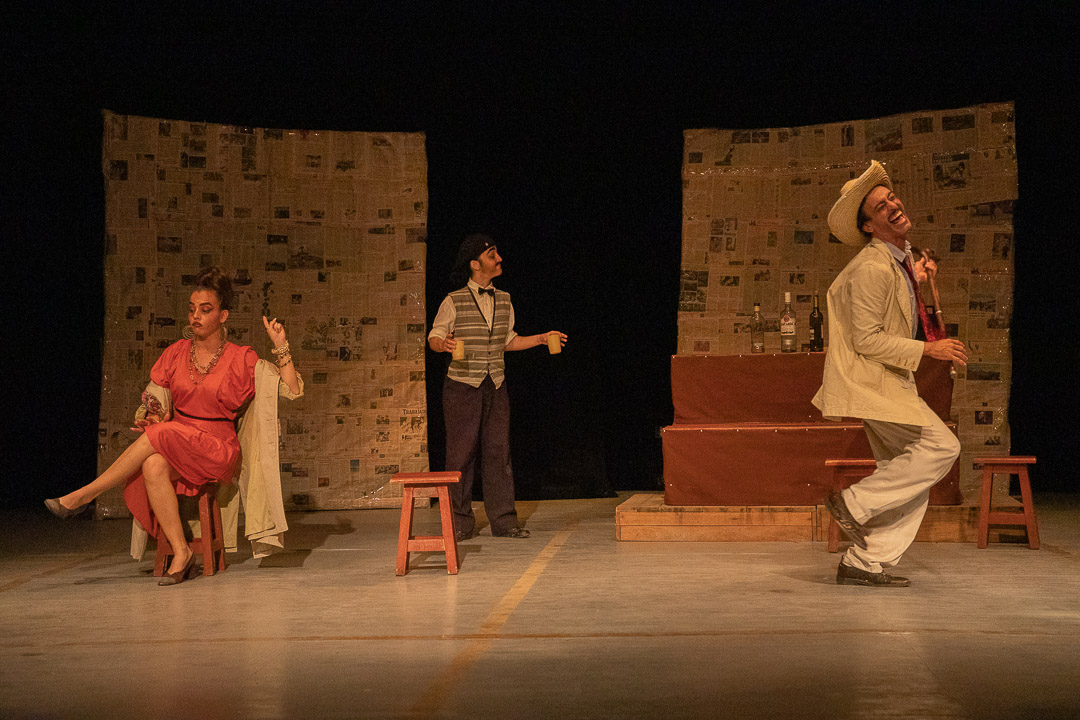
Camagüey, April 29. - Theater, in Cuba, is usually born against the current. But when it manages to arrive on the scene, it does so with the force of a vital necessity. This is how the premiere of Delirio, by the Kaizen Teatro collective, directed by Yoshiaky Méndez, felt. It wasn't just the first performance of a play; it was the symbolic foundation of a commitment: to create theater from Camagüey, with what's there, with those who are there, with what's dreamed of.
It takes place in an abandoned warehouse of a psychiatric hospital. The synopsis also specifies that the play follows the thread of an imitation game. The patients embody a prestigious bartender and two Cuban music personalities. As night falls, the place becomes a bar for three protagonists of a story.
The original piece Delirio habanero, by Alberto Pedro, already a classic in the national repertoire, is articulated from music, humor and identity. In this new reading its essence is not betrayed, but the sensitivity of another generation is filtered. The tone of comedy is not one of self-confidence, but of precision. There's singing—a lot of it—there's play with archetypes, there's a celebration of voices. Memory is rescued not as a relic, but as a vibration.

Yoshiaky takes on the character of El Bárbaro del Ritmo – a fictional Benny Moré who sometimes seems more like himself than a character – and also directs. That double gesture, in front of the audience and behind the stage fabric, is already a brave act, even more so if we think that this is his debut as a director.
Curiously, Yoshiaky should have been called Bárbaro. He was born on December 4th, St. Barbara's Day. But his uncle, in military service, ran away to go to the maternity hospital and said that if they didn't give him the name he wanted, he wouldn't turn himself in. And her sister gave in. Thus was born Yoshiaky—the Japanese name that now marks this theatrical rebirth, and which also carries the stage destiny of playing the "Bárbaro."

At his side, two actresses who, while still unknown to the general public, sustain the show with dedication: Lisandra Rivero, with a decade of experience in children's theater in Bayamo, embodies La Lupe in her first role for adults; Rocío Calvo, a second-year student at the Vicentina de la Torre Academy, plays Varilla, the famous bartender at La Bodeguita del Medio, and remains on stage almost without interruption. Both teachers entrusted her with the most constant role: a show of trust, risk and live training.
The duration – approximately one hour and forty – feels light. Perhaps the final section could benefit from greater synthesis, but it never falls into tedium. On the contrary, there is a balance between fun and contemplation, between winking and truth. Characterization is one of the high points: each character has texture, has a face, has its own voice.

It is noted that the singing was distributed according to each person's possibilities: Yoshiaky carries the vocal weight; Rocío performs a single song, but does so with grace and presence. Overall, what you hear is enjoyable. Nothing feels forced, nothing clashes.
This Delirium is a manifesto. In times where the Camagüey’s scene has seen its diversity of projects reduce, the emergence of Kaizen Teatro—whose name alludes to the Japanese concept of continuous improvement—means a renewal of energy. And even more so, a taking of position: creating from the center, from the margin, from the root.
It has been presented in Las Tunas and Bayamo, but its premiere in Camagüey was this April 24th. The work will be on the billboard on April 26, and May 1, 2, 3, 8, 9, 10, from 7:30 p.m. at the José Luis Tasende Cultural Center, headquarters of Teatro del Viento.
Although this is its first public work, the collective has been rehearsing and dreaming for months. If all goes as planned, they will celebrate their first anniversary in August. A symbolic anniversary for a group that begins with a work that is, in itself, a celebration of what we are.
The unpublished interview with Yoshiaky, carried out in 2022, but which we rescue now, gives clues about that impulse. Then he was talking about a project inspired by Coffee & Cigarettes that was never set up with the Contemporary Ballet of Camagüey. But he also spoke of his desire to direct, to reinvent himself, to break with the actor's ego and bet on a lively, sincere, ironic, human scene.
"I keep dreaming, but saner. I dream with what I have at the moment," he said.
"I don't dream about what a project could give me, but about what I can give it," Yoshiaky adds.
This is what is perceived in Delirio as a letter of introduction: an unadorned dedication, a truth built collectively. Perhaps that's the most valuable aspect: that beyond the text, beyond the staging, what emerges is a space. A place for rehearsal, for memory, for risk. To begin again. (Yanetsy León González/Adelante Digital) (Photos: Leandro Pérez Pérez/Adelante Digital)